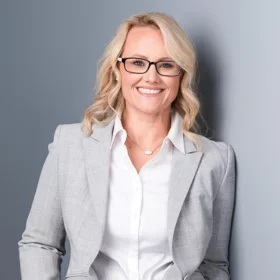Tonya Manning’s nearly thirty-year career as an actuary almost never happened. When she was a mathematics major in college, she assumed actuarial science was limited to number crunching. While Manning wanted to use her math degree to help formulate solutions for problems affecting society, she just couldn’t see how a job in actuarial science would align with her career aspirations.
That assumption changed after Manning accepted a job at a pension consulting firm. From that experience, she realized the important work of pension actuaries to ensure income for people during their retirement years. But beyond pensions, there are vast applications of actuarial science across industries that can have a great impact on addressing larger issues such as climate change and disaster risk; cybersecurity; delivery of health care; and more. Manning has held multiple positions, including as an actuary at the U.S. Department of Treasury and the President of both the Society of Actuaries, the largest actuarial association globally, and the International Actuarial Association, representing associations of all actuaries across the globe. She is currently the Chief Actuary and Wealth Practice Leader at Buck and serves on numerous advisory councils and boards.
Once a year Manning teaches a course on pensions for the M.S. in Actuarial Science program at the Columbia University School of Professional Studies. In this interview, she discusses her career path and why she is excited to introduce students to actuarial science.
What excites you about the actuarial profession?
I like actuarial science because I get to take my math knowledge and apply it in a real way that offers solutions. And, as a consulting actuary, I enjoy working with other actuaries and business leaders. Even better, I get to help secure retirement income for people.
What do you think would surprise people about the role of actuarial science in business?
Some people might be surprised by how deeply involved actuarial science is in understanding the financial risk associated with climate change. If you look at the risks to businesses—and even financial systems—climate change affects far more things than people realize.
Another area where actuaries are beginning to play a greater role is banking. Actuaries offer skills in financial risk modeling that can be used to support pricing and portfolio optimization. As the global banking industry continues to transform the way it views, manages, and regulates risks, it is quite possible actuaries will evolve as the premier choice for prudent bank risk management and the assessment of financial strength.
How can actuarial science help with social issues?
Actuaries can examine various risks and create solutions that help people address financial insecurity. In the U.S., Steve Goss is the Chief Actuary for the Social Security Administration. He and his staff are responsible for overseeing the strength of social insurance programs, evaluating the amount people are contributing through their paychecks and the expected benefits to be paid out. Lawmakers require this important analysis in order to manage the system and keep it strong so people will be able to receive their benefits.
What do you teach at Columbia, and how is it important to those studying actuarial science?
I teach the course on pensions. Generally speaking, an employer will use a defined benefit plan to guarantee its employees' retirement income, typically through a monthly check as long as the employee is alive. The concept is simple, but the financial implications are quite complicated. To help employers manage the costs of these promises, actuaries need to predict when each employee will start their benefit, its size, and—most importantly—how long they will receive it. This is critical because employers have to put the appropriate amount of money in a secured trust in advance. It’s important for Columbia students to be exposed to this as a potential career path or specialty, as pension plans require actuaries to ensure that those benefits are properly funded.
What have been some rewarding moments for you as a Columbia lecturer? How does it differ from working at a company?
I love teaching once a year because I get to dig in and go back to the basics of pension actuarial science. I also include current trends in every lecture, such as news articles, recent research, or changes in the law to explain the current environment, as well as the evolution of retirement. Every class is absolutely different in terms of what students find interesting, what they know, and what they don't know. Also at Columbia, there are a lot of international students, so I've been fortunate to teach students who are from Asia, Europe, and other parts of the world. It’s interesting to hear their perspectives.
What career advice do you have for students in the program?
Columbia allows students to network and to learn about the different applications of actuarial science. I initially eliminated actuarial science as a career in college because it sounded uninteresting to me. My advice is that if you want to become an actuary, make sure you understand all of the different ways actuarial science is used, and then choose a path that fits your goals. For example, if you like risk analytics and modeling, choose a career that is appropriate for that. If you like working with businesses and people like I do, you can look at the pension or health industry and think more about the consulting side. Be brave and look at some interesting things going on with data science as it applies to actuarial science, and don’t be afraid to go into new areas. And no matter what your role, consider taking a class in something other than math, like art appreciation or communication to be well-rounded and to give you a different perspective. Then you will be that much more successful in whatever you choose.


